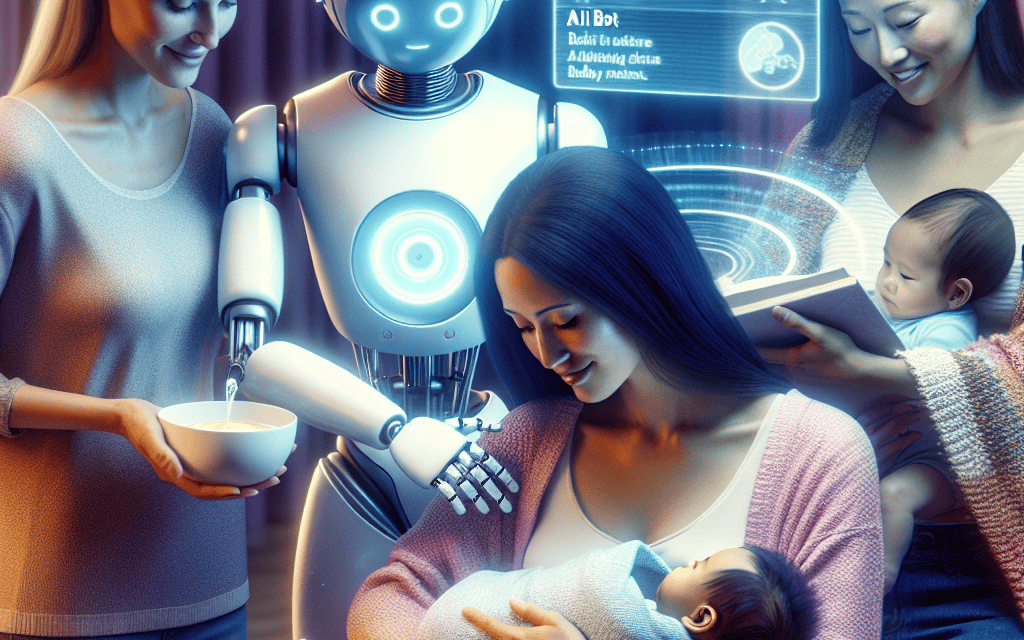Harnessing AI to Support New Mothers: Unlocking Its Potential
The journey of motherhood is a transformative experience, filled with joy, challenges, and a steep learning curve. New mothers often find themselves navigating a myriad of responsibilities, from caring for their newborns to managing their own health and well-being. In recent years, artificial intelligence (AI) has emerged as a powerful tool that can support new mothers in various aspects of their lives. This article explores the potential of AI in assisting new mothers, focusing on five key areas: personalized health monitoring, parenting support, mental health resources, community building, and education and training.
1. Personalized Health Monitoring
One of the most significant ways AI can support new mothers is through personalized health monitoring. The postpartum period is critical for both the mother and the baby, and AI technologies can help track health metrics, provide insights, and facilitate timely interventions.
1.1 Wearable Technology
Wearable devices equipped with AI algorithms can monitor vital signs, sleep patterns, and physical activity levels. For instance, smartwatches and fitness trackers can provide real-time data on heart rate, sleep quality, and even stress levels. This information is invaluable for new mothers who may experience postpartum complications or need to manage their physical health while caring for a newborn.
- Heart Rate Monitoring: Elevated heart rates can indicate stress or anxiety, common issues for new mothers. AI can analyze this data and suggest relaxation techniques or alert healthcare providers if necessary.
- Sleep Tracking: Sleep deprivation is a common challenge for new mothers. AI can help track sleep patterns and provide personalized recommendations for improving sleep quality.
- Activity Levels: Encouraging physical activity is essential for postpartum recovery. AI can set personalized fitness goals based on the mother’s current health status and recovery progress.
1.2 Telehealth and Remote Monitoring
AI-powered telehealth platforms enable new mothers to consult healthcare professionals from the comfort of their homes. These platforms can analyze symptoms and provide preliminary diagnoses, reducing the need for in-person visits. For example, AI chatbots can ask a series of questions to assess a mother’s health and suggest appropriate actions, such as scheduling a doctor’s appointment or providing self-care tips.
Moreover, remote monitoring tools can track postpartum recovery metrics, such as blood pressure and weight, and send alerts to healthcare providers if any readings fall outside the normal range. This proactive approach can lead to early interventions and better health outcomes.
1.3 Data-Driven Insights
AI can analyze vast amounts of health data to identify trends and provide personalized insights. For instance, machine learning algorithms can predict potential health issues based on a mother’s medical history and lifestyle choices. This predictive capability allows healthcare providers to offer tailored advice and interventions, enhancing the overall care experience for new mothers.
Additionally, AI can help mothers understand their bodies better by providing insights into hormonal changes, nutritional needs, and recovery timelines. This knowledge empowers mothers to make informed decisions about their health and well-being.
2. Parenting Support
Parenting is a complex and often overwhelming task, especially for first-time mothers. AI can provide valuable support in various aspects of parenting, from baby care to developmental milestones.
2.1 Smart Baby Monitors
Smart baby monitors equipped with AI technology can offer more than just audio and video feeds. These devices can analyze a baby’s sleep patterns, detect unusual sounds, and even monitor breathing rates. For example, the Owlet Smart Sock uses pulse oximetry to track a baby’s heart rate and oxygen levels, alerting parents if any abnormalities are detected.
- Sleep Analysis: AI can analyze sleep data to provide insights into a baby’s sleep cycles, helping parents establish healthy sleep routines.
- Health Alerts: Advanced monitors can send alerts to parents’ smartphones if they detect irregularities in the baby’s breathing or heart rate.
- Developmental Milestones: Some smart monitors can track developmental milestones and provide personalized tips for encouraging growth and learning.
2.2 Virtual Parenting Assistants
AI-powered virtual assistants, such as chatbots and mobile apps, can offer parenting advice and support. These tools can answer common questions about baby care, feeding, and developmental milestones. For instance, apps like BabyCenter provide personalized content based on the baby’s age and developmental stage, helping parents navigate the challenges of parenting.
Moreover, these virtual assistants can offer reminders for feeding times, diaper changes, and pediatrician appointments, helping new mothers stay organized and on top of their responsibilities.
2.3 Personalized Parenting Resources
AI can curate personalized parenting resources based on a mother’s preferences and needs. For example, machine learning algorithms can analyze a mother’s reading habits and recommend articles, videos, and podcasts that align with her interests. This tailored approach ensures that new mothers receive relevant information that resonates with their parenting style.
Additionally, AI can help mothers connect with other parents facing similar challenges, fostering a sense of community and support.
3. Mental Health Resources
The postpartum period can be emotionally challenging for many mothers, with issues such as postpartum depression and anxiety affecting their well-being. AI can play a crucial role in providing mental health resources and support.
3.1 AI-Powered Mental Health Apps
Several AI-driven mental health apps are designed to support new mothers by offering tools for managing stress, anxiety, and depression. These apps often include features such as mood tracking, guided meditation, and cognitive-behavioral therapy (CBT) exercises. For example, apps like Woebot use AI to engage users in conversations, providing emotional support and coping strategies.
- Mood Tracking: Users can log their moods and receive personalized feedback based on their emotional patterns.
- Guided Meditation: Many apps offer guided meditation sessions tailored to the needs of new mothers, helping them relax and reduce stress.
- CBT Techniques: AI can deliver CBT exercises that help users challenge negative thoughts and develop healthier coping mechanisms.
3.2 Online Support Groups
AI can facilitate the creation of online support groups for new mothers, connecting them with others who share similar experiences. These groups can provide a safe space for mothers to share their feelings, seek advice, and offer support to one another. AI algorithms can match mothers based on their interests, challenges, and parenting styles, fostering meaningful connections.
Moreover, AI can analyze discussions within these groups to identify common themes and concerns, allowing facilitators to provide targeted resources and support.
3.3 Early Detection of Mental Health Issues
AI can assist in the early detection of mental health issues by analyzing data from various sources, such as social media activity, app usage, and self-reported symptoms. For instance, machine learning algorithms can identify patterns indicative of postpartum depression or anxiety, prompting timely interventions.
Healthcare providers can leverage this data to reach out to mothers who may be struggling, offering support and resources before issues escalate.
4. Community Building
Building a supportive community is essential for new mothers, as it provides a network of resources, encouragement, and shared experiences. AI can enhance community building in several ways.
4.1 Social Media Platforms
AI algorithms can curate content on social media platforms, connecting new mothers with relevant groups, discussions, and resources. For example, Facebook uses AI to suggest groups based on users’ interests and interactions, helping mothers find communities that resonate with their experiences.
- Targeted Recommendations: AI can analyze user behavior to recommend groups focused on specific topics, such as breastfeeding, postpartum recovery, or parenting tips.
- Content Moderation: AI can help moderate discussions within these groups, ensuring a safe and supportive environment for all members.
- Event Organization: AI can assist in organizing local meetups and events for mothers, fostering in-person connections.
4.2 Online Forums and Platforms
Dedicated online forums and platforms can leverage AI to create supportive spaces for new mothers. These platforms can facilitate discussions on various topics, from baby care to mental health. AI can analyze user interactions to identify trending topics and provide relevant resources.
For instance, platforms like Peanut connect mothers based on shared interests and experiences, allowing them to engage in meaningful conversations and support one another.
4.3 Resource Sharing
AI can facilitate resource sharing among mothers, allowing them to exchange tips, recommendations, and experiences. For example, platforms can use AI to match mothers with similar needs, enabling them to share resources such as childcare recommendations, local services, and parenting tips.
This collaborative approach fosters a sense of community and empowers mothers to support one another in their parenting journeys.
5. Education and Training
Education and training are vital for new mothers as they navigate the complexities of motherhood. AI can enhance learning experiences and provide valuable resources for skill development.
5.1 Online Courses and Workshops
AI can facilitate the creation of personalized online courses and workshops tailored to the needs of new mothers. These courses can cover a range of topics, from infant care to postpartum recovery. For instance, platforms like Coursera and Udemy can use AI algorithms to recommend courses based on a mother’s interests and learning preferences.
- Customized Learning Paths: AI can create personalized learning paths that adapt to a mother’s progress and preferences.
- Interactive Learning: AI can enhance online courses with interactive elements, such as quizzes and simulations, to reinforce learning.
- Expert Access: Some platforms can connect mothers with experts for live Q&A sessions, providing valuable insights and support.
5.2 Parenting Simulations
AI-driven simulations can provide new mothers with hands-on experience in various parenting scenarios. For example, virtual reality (VR) simulations can allow mothers to practice skills such as diaper changing, feeding, and soothing a crying baby in a safe environment. This experiential learning approach can boost confidence and competence in new mothers.
Moreover, AI can analyze a mother’s performance in these simulations, providing feedback and suggestions for improvement.
5.3 Continuous Learning and Development
AI can support continuous learning by providing ongoing resources and updates on parenting trends and research. For instance, AI algorithms can curate articles, videos, and podcasts based on a mother’s interests, ensuring she stays informed about the latest developments in parenting and child development.
This commitment to continuous learning empowers mothers to adapt their parenting strategies and make informed decisions for their families.
Conclusion
As new mothers navigate the challenges of motherhood, AI presents a wealth of opportunities to enhance their experiences and support their well-being. From personalized health monitoring to parenting support, mental health resources, community building, and education, AI has the potential to transform the postpartum journey.
By harnessing the power of AI, we can create a supportive ecosystem that empowers new mothers, fosters connections, and promotes healthy development for both mothers and their children. As technology continues to evolve, it is essential to prioritize the needs of new mothers and leverage AI to unlock its full potential in supporting their unique journeys.
In summary, the integration of AI into the lives of new mothers can lead to improved health outcomes, enhanced parenting experiences, and a stronger sense of community. By embracing these innovations, we can ensure that new mothers receive the support they need to thrive during this critical period of their lives.




